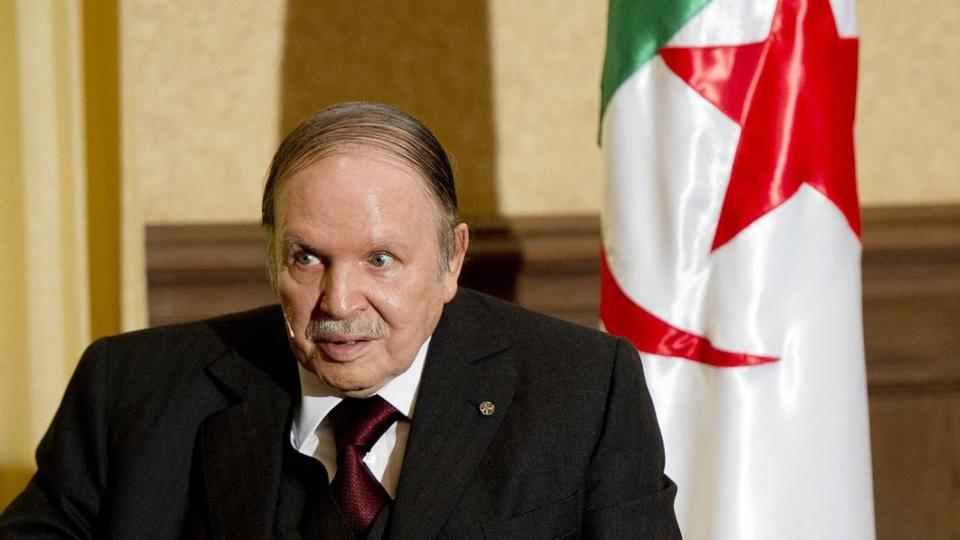After suffering a crippling stroke in 2013, Bouteflika retreated from the public limelight. In 2014, he earned the nickname of “the phantom president” when he was elected for a fourth consecutive term – without even appearing in person on the campaign trail.
Even his exact role in Algeria’s war of independence from France is not known for certain, although Bouteflika reportedly joined the National Liberation Army, the military branch of the National Liberation Front (FLN), in 1956, at the age of 19.
Bouteflika, a protege of former Algerian leader Houari Boumediene, belonged to a generation of leaders that ruled Algeria since it gained independence. In 1962, Bouteflika served in Algeria’s first post-colonial government as the minister of youth and sports. A year later, at the age of 26, he was appointed minister of foreign affairs, becoming the youngest person in the world to hold such a position.
During his years in office, Bouteflika emerged as a towering figure, both in Arab politics and in the Non-Aligned Movement. He hosted the late Palestinian leader Yasser Arafat, chairman of the Palestine Liberation Organization (PLO), in Algiers in 1974. That same year, he ordered the expulsion of South African officials from Algeria in protest against its apartheid system.
Respected throughout the newly independent states worldwide, Bouteflika was appreciated in Europe, too.
When then-President Boumediene lost his life to a rare blood disease in 1978, he left behind a power vacuum that Bouteflika wanted to fill. But Chadli Bendjedid, former minister of defence with strong military backing, seized power in 1979, forcing Bouteflika out of the political arena.
Two years later, Bouteflika was convicted of embezzling more than $23m from Algeria’s embassies. In his defence, he claimed the money had been merely “reserved” to build a new building for his ministry. Although he was granted amnesty, Bouteflika spent the next two decades in luxurious exile between Switzerland and the Gulf states, allegedly becoming a multimillionaire during this time.
Bouteflika returned to Algeria’s political stage in 1999, with the military’s support. At the time, Algerians were still traumatised by the atrocities committed during the so-called “black decade”, in which nearly 150,000 Algerians were killed in a civil war between rebels and the government.
Five months later, Bouteflika held a referendum on the Law of Civil Concord, a peace agreement offering amnesty to rebels willing to lay down their arms. The newly elected president gained widespread popular support, with more than 98 percent voting in favour of the law. Most of the former fighters agreed to do so, although some fled underground.
“Islamic terrorism has been almost entirely defeated in Algeria under President Bouteflika, but it [hasn’t been] completely eradicated with the growing presence of al-Qaeda in the Islamic Maghreb [AQIM] and Jund al-Khilafa, a group affiliated with [ISIL],” said Aomar Baghzouz, a professor of law at the University of Tizi Ouzou.
Bouteflika’s government enjoyed international support because of its support for the so-called “war on terror”, and the country’s immense oil and natural gas reserves.
‘Scandal of the century’
As an oil-rich country, Algeria saw a modernisation of its infrastructure under President Bouteflika. However, development was accompanied by allegations of widespread corruption.
The construction of the East-West Highway, which was launched in 2006 and dubbed the “project of the century” became known as the “scandal of the century” instead. The highway connecting Algeria’s borders with Tunisia and Morocco was initially estimated to cost $7bn, but the price tag ballooned to $13bn, leaving many to suspect the funds had been distributed in bribes.
In 2015, an Algerian court sentenced 14 people to prison and fined seven foreign firms, condemning them for corruption, money laundering, and embezzlement of public funds.
However, with military and international backing, Bouteflika easily won landslide election victories in 2004 and 2009, facing relatively unknown challengers. His third and fourth terms in office were made possible by a 2008 constitutional amendment that removed presidential term limits, a move which was slammed by the opposition as a setback to democracy.
“Bouteflika had always wanted to concentrate all the powers in his hand, refusing to be ‘three-quarters of a president’, as he said,” explained former Algerian Prime Minister Ali Benflis. “Bouteflika gave himself the option [of] remaining head of state for life.”
Indeed, Bouteflika maintained his grip on power through repression, nepotism and vote-buying, experts say. In 2011, under the pressure of the Arab Spring protests sweeping across the region, Bouteflika lifted a state of emergency that had been in effect for 19 years. Nevertheless, Algerian police continued to disperse nearly all demonstrations that took place in the country.
Experts cite two main reasons why Bouteflika survived the Arab Spring: First, his administration managed through propaganda to convince the public that it alone was able to prevent Algeria from sliding into chaos. “After the ‘black decade’, Algerians [were] reluctant to call for a dramatic change, placing high priority on stability and security,” Nacer Djabi, a sociology lecturer at the University of Algiers, told Al Jazeera.
In addition, funded by oil revenue, Bouteflika’s government had been able to buy social peace by providing subsidies and assistance.
“The longevity of Bouteflika in power shows the resilience of a system that intends to lead the ‘change’ it wants, whenever it wants. But the reduction of Algeria’s financial reserves raises questions over its capacity to resist such [a] crisis,” Baghzouz explained.
According to Boubekeur, Algeria’s longest-serving leader was always looking out for his own best interests.
“At the beginning of his career, Bouteflika was considered as a socialist activist … The truth is that Bouteflika had never believed in any ideological and political project and had only been motivated by both money and power. He leaves no school of thought.”
Source: Aljazeera



Comment here
You must be logged in to post a comment.